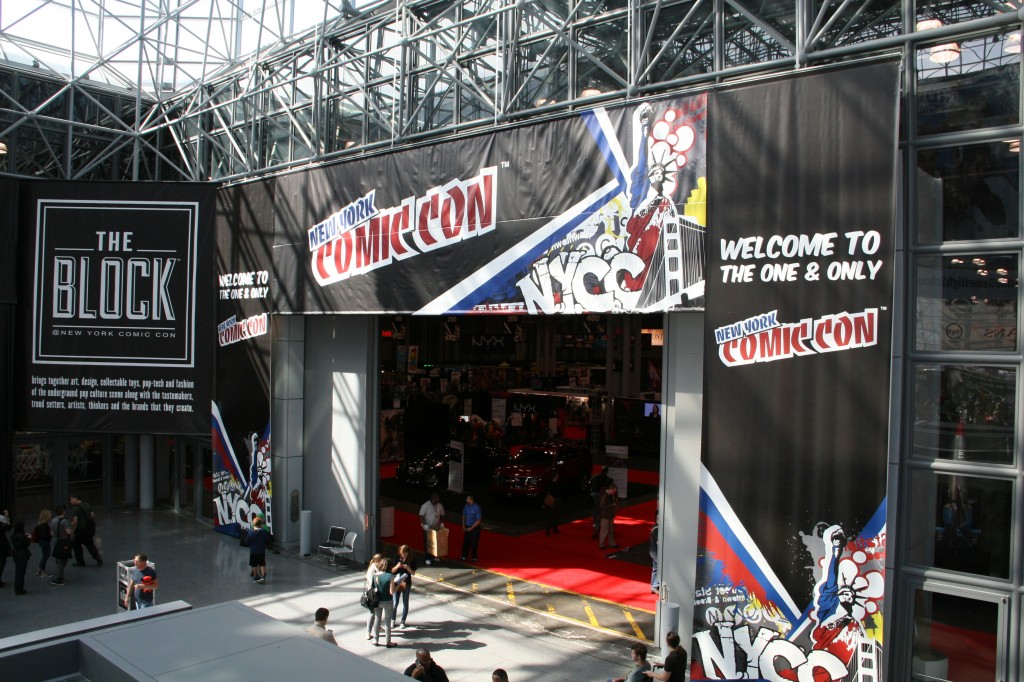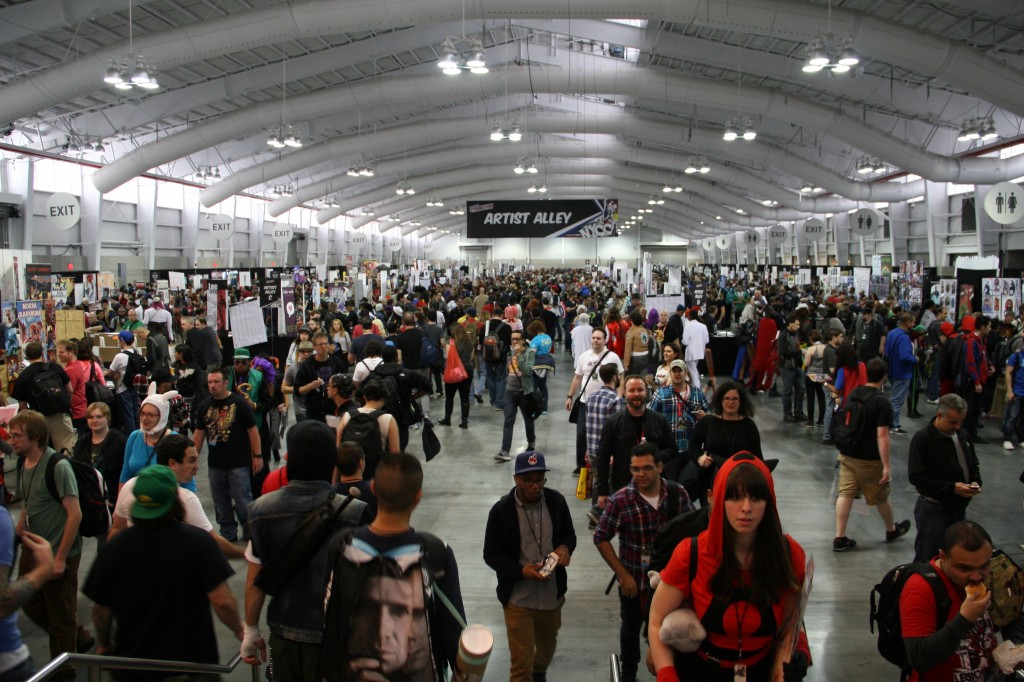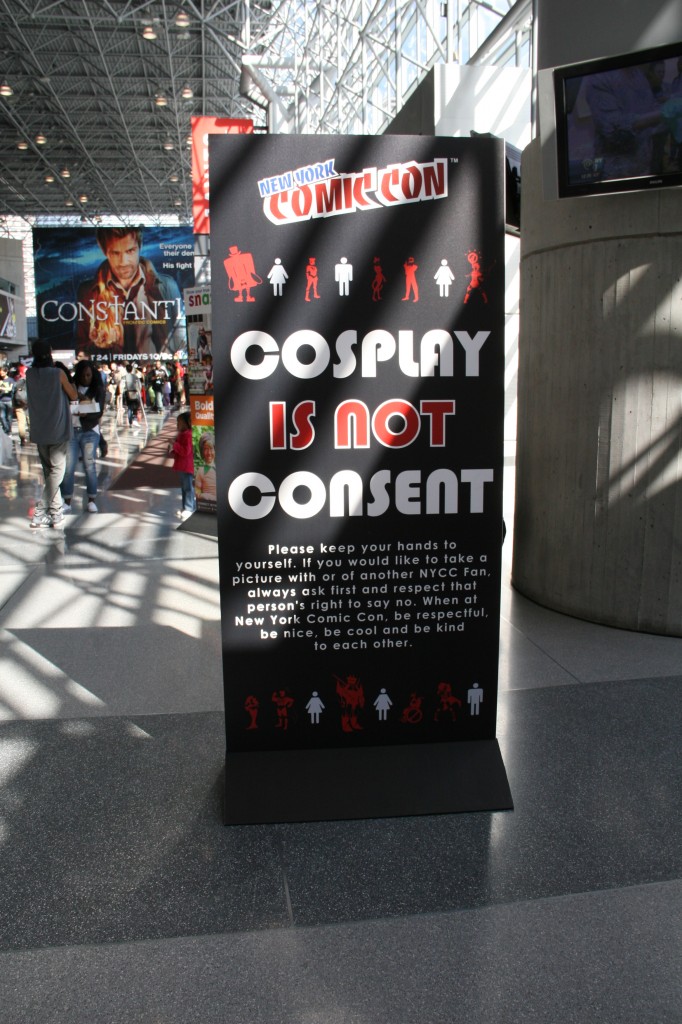This year at the New York Comic Con when I walked into the atrium-like Javits Center where the con was held, a lot of things immediately vied for my attention–con-goers by the droves, staff members directing people with bullhorns, long lines, and giant, brightly colored banners–but what really caught my eye was an unassuming stand alone sign that read, simply, “Cosplay is Not Consent.” I can’t explain how relieved and excited I was when I saw that sign. In fact, I’m pretty sure something along the lines of “Holy shit” crossed my lips. Not only were there “Cosplay is Not Consent” signs posted by the entrance, but they were peppered throughout the main space as well, including a giant banner strung across the hallway leading to Artists Alley.
I’ve never been harassed at NYCC, or any convention for that matter, at least nothing beyond some not-too-subtle staring at my chest by (male) attendees. And yet the positivity and unexpected relief I felt when I read those four words (and when I realized that those four words spoke to a larger, official anti-harassment policy) was damn near tangible. Let me tell you, being relieved about something I didn’t consciously know I was worried about is a very strange feeling. These signs weren’t the only places con-goers could be made aware of the policy, either. Reedpop (the company behind NYCC and Special Edition) printed the anti-harassment policy in this year’s program as well, and reporting harassment was as easy as tapping an icon in the official NYCC app.
This anti-harassment policy isn’t the first of its kind (both Heroes Con and Emerald City Comic Con, among others, debuted similar ones earlier this year), and it isn’t the ultimate solution to this problem, but it is a huge step in the right direction. Harassment policies treat the symptoms of a much larger societal problem of power imbalances and systemic oppression. But a visible, accessible anti-harassment policy at New York Comic Con? That’s important. According to some reports, over 151,000 people attended the convention this year. Every single one of those people were exposed to these “Cosplay is Not Consent” signs. The full policy language, which can be found inside the program and on the app, is surprisingly approachable. There’s no legal jargon here.
“We have a zero tolerance policy for harassment of any kind,” it reads. The policy clearly lists any behavior that could be categorized as harassment, including “Stalking,” “Harassing photography or recording,” and “Unwelcome physical attention.” “Our policy applies to everyone,” it reads, before going on to list everyone from exhibitors to fans, guests to press, staff to security. Though the focus of the policy is on protecting cosplayers, it also broadens out to encapsulate everyone involved with the convention, going on to ask con-goers “to be respectful, be nice, be cool and be kind to one another.” The language here is never muddled: misbehave, violate any of these guidelines we’ve given you and you could be kicked out of the con, and we might even call the police. The clarity of the anti-harassment policy is as important as the text itself.
At the “#YesAllGeeks: Let’s Talk About Harassment in Fandom” panel held on Saturday at NYCC, further issues surrounding harassment at conventions were discussed, chief among them the anti-harassment policies that have become so important. Mikki Kendall, writer and panelist, explained that an essential part of preventing harassment was to have clear policies about how those kinds of behaviors would not be tolerated. In order to create a safer community, harassers need to learn that their behavior is not welcome. By creating harassment policies, and following through on punishments dictated by those policies, a safer space will be guaranteed for everyone. Harassers will either stop coming to events that they might get kicked out of, or they’ll curb their behavior when they realize that it isn’t being tolerated. Another panelist, Robert Anders, reiterated that these policies need to exist, and that they absolutely have to be enforced. We, as a community, cannot fail those who report their harassers.
Of course, the best way to prevent harassment is to not harass anyone, but the existence of harassers and of groups like GamerGate, who show how damaging harassment in the geek community can be, prove that anti-harassment policies are necessary. To have one of the largest–if not THE largest–cons in the country have such a visible and accessible policy is important in creating a dialogue about how we can be more respectful and kind to one another. Even after the con has ended, remembering the positivity and hope I felt when I first saw that sign makes me, a terrible pessimist, encouraged for our future as a community.
For more information on harassment at cons and what you can do to foster a safer space for everyone, please check out the #YesAllGeeks resources page here. All photographs taken by Christina Harrington.





